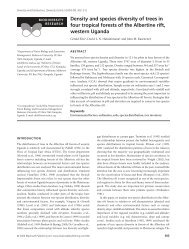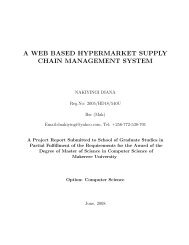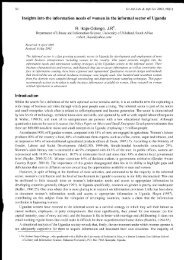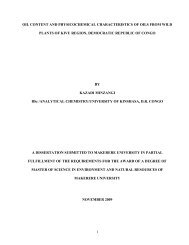THE UNIVERSITY OF LEIPZIG
THE UNIVERSITY OF LEIPZIG
THE UNIVERSITY OF LEIPZIG
You also want an ePaper? Increase the reach of your titles
YUMPU automatically turns print PDFs into web optimized ePapers that Google loves.
myths and ceremonies devised by many societies and assimilated into various organizations.<br />
However, critics have argued that by relying on the above metaphors, sociological<br />
institutionalists fail to specify the casual processes through which structures enable and<br />
empower actors and the constituted actions. As a result they neglect the important role of<br />
agency in policy making and their theory of action leaves the impression that actors blindly<br />
follow institutional adopts and cues around them. 252<br />
The sociological institutionalists are also accused of being too specific and supportive of<br />
local/cultural knowledge. This is based on the fact that sociological institutional explanations<br />
are arrived at inductively rather than deductively and hence can lend insight into individuals’<br />
reasons for actions. 253 However, Katzenstein notes that there is a big danger for<br />
generalizations because sociological institutionalism can appear culturally deterministic<br />
where it emphasizes the cultural routines and rituals to the exclusion of individual action<br />
which breaks out cultural norm, that is to say rule making and rule creation as opposed to rule<br />
following action. 254<br />
In summary, the most intriguing question that motivated this exposition is; what exactly are<br />
institutions and what is institutionalism? The examination in this chapter made an exploration<br />
of the theoretical underpinning regarding the concepts of institutions and institutionalism. In<br />
the process, we have seen the role of institutions in mediating political and economic as well<br />
as social order. However, it is striking to note that although no single branch of<br />
institutionalism can be used in total isolation of the other, it is also an uphill task to combine<br />
the three approaches. In the subsequent chapters, we shall examine the institutional process<br />
that shape natural resource regimes in Kenya. Specifically, our study shall benefit from the<br />
tenets of historical and sociological institutionalism in making this evaluation.<br />
252<br />
Meyer, J. W. and W.R, Scott. 1983. Organizational Environments: Ritual and Rationality. California: Sage<br />
Publications.<br />
253<br />
Pettigrew, A.M. 1997. What is processual analysis? In Scandinavian Journal of Management 13 (4):337-348.<br />
254<br />
Katzenstein, P. J. 1986. Cultural Norms and National Security: Policy and Military in Post war Japan.<br />
Ithaca/New York: Cornell University Press.<br />
51






